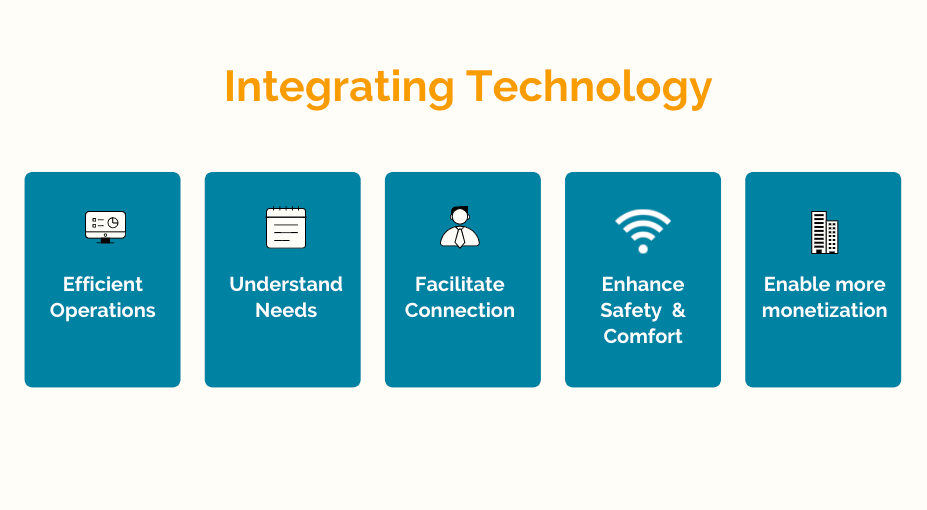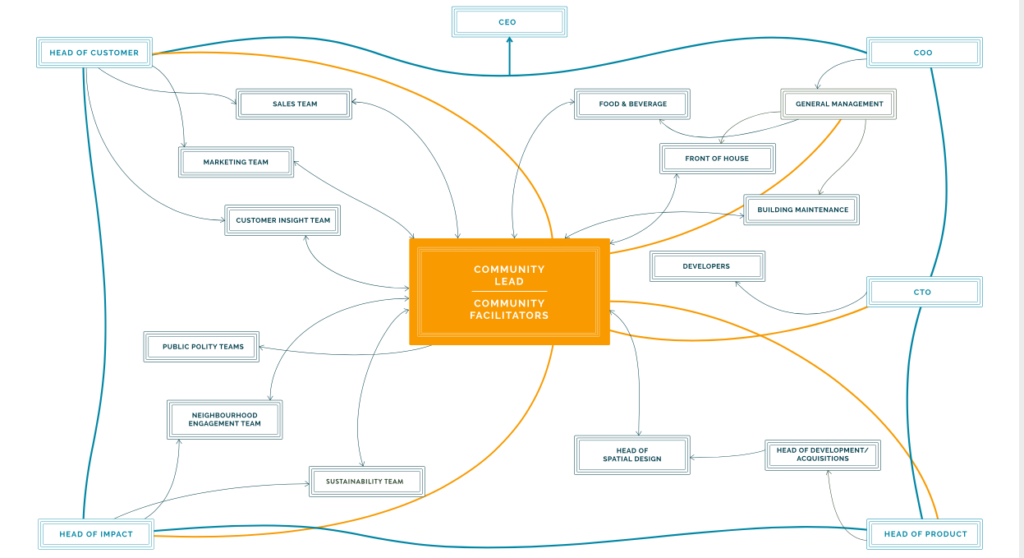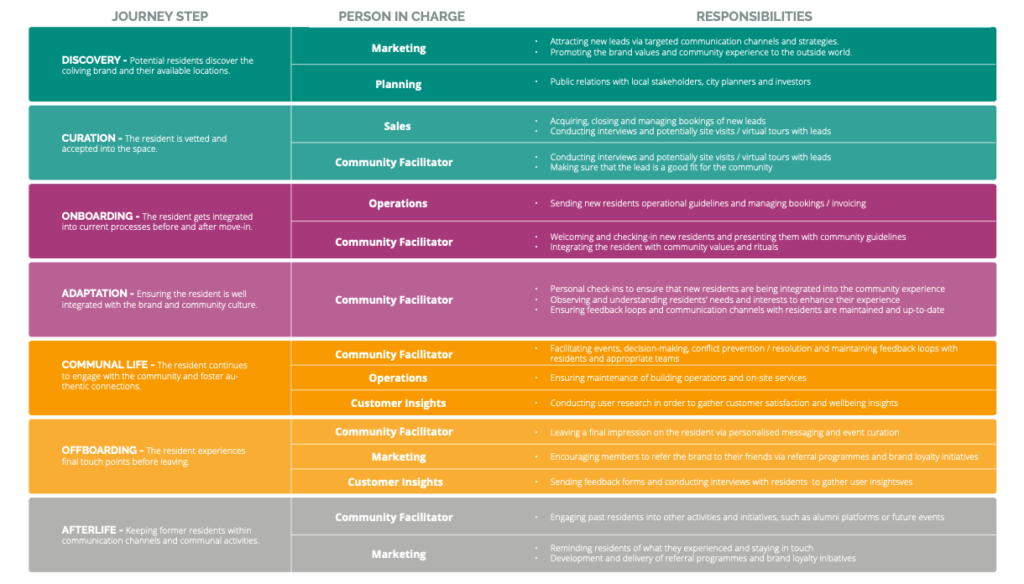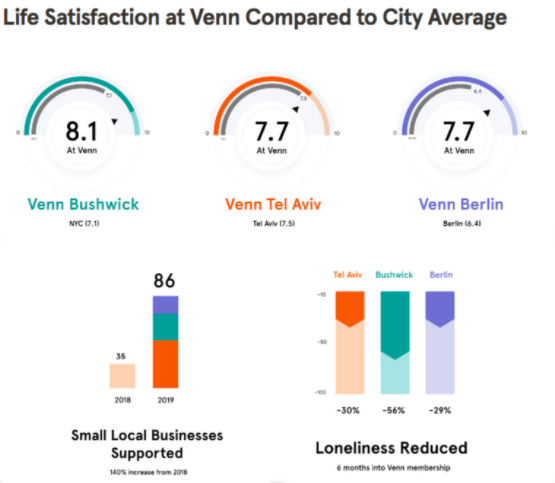Conscious Coliving co-founders Naima Ritter Figueres and Matt Lesniak were invited to speak at The Student Hotel (TSH) Summer Festival. The keynote explores how to foster thriving communities and how a thriving community is beneficial for the members and business of TSH. Before we deep dive into this article, here you can watch the full keynote. Get some 🍿and enjoy!:
The invitation came after Lucien van Geffen, who is Director of Partnerships and Community Life for TSH, read The Community Facilitation Handbook. Lucien felt that it strongly validated TSH’s efforts to foster and promote community life. In this article, we will share key highlights from the keynote, illustrate several examples of The Student Hotels’s positive impact, and invite you to explore your shared purpose as a human being alive on this planet today.
What is our
shared purpose as
humans living on this planet
at this moment in time?
This is perhaps not the question that The Student Hotel (TSH) staff expected to be asked during their latest internal training week at the One Team, One Community, One Experience, Game On(e) Summer Festival. And upon reflection, TSH staff can feel proud that they are part of a company that is already making big waves of positive impact on communities at the local, European and global level.
Highlights from the Keynote
Grounded in research and case studies, the keynote, titled How to Foster Thriving Community for Members and Business was very well received and covered:
- The meaning of community;
- The impact of the community experience on members and the business;
- The mindset, challenges and key aspects for how to make a community thrive
- The role of tech in fostering a thriving community;
- Examples of community and purpose-driven organizations and why are they successful;
- Why fostering community is a responsibility for everyone, and how to facilitate community through different roles.
We share highlights from each of these areas below.
What is a Thriving Community?
To start off, we asked TSH staff to share what words come up when they envision their ideal community.
They responded with things like:
belonging, support, fun, togetherness, shared experiences, common grounds, diversity, inspiration, safety and friendship.
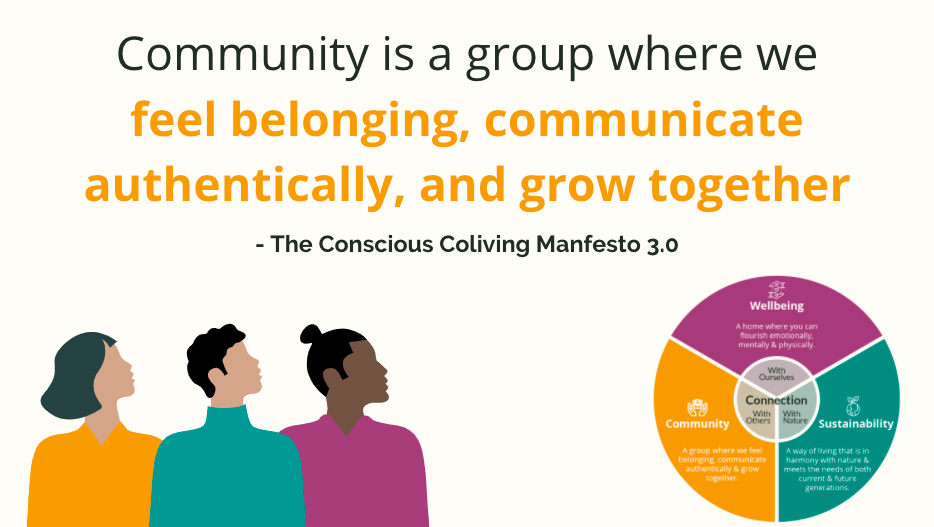
We then shared our definition of thriving community from The Conscious Coliving Manifesto, which is a group where we feel belonging, communicate authentically, and grow together.
We also shared community definitions from other key players of the shared living sector, noting that what is clear among all of them is that community is not just about people sharing four walls. An authentic and thriving community must include key elements such as a sense of emotional connection, belonging, participation, engagement and common goals and values.
Impact of Thriving Community
The impact that a strong community can have on its members is significant. Key areas of impact that we discussed during the keynote include:
- Personal and professional growth as residents feel more safe and are encouraged to discover and share their gifts and talents;
- Enhanced individual and collective wellbeing through an increased sense of belonging and connection;
- Easier and more efficient lifestyle as community members share resources, knowledge and skills.
The impact that community can have on the business is equally as powerful. Some of the main ways we mentioned include:
- Longer retention and less turnover rates as residents and staff who feel belonging and an enhanced sense of wellbeing will want to stay longer;
- Cost savings on marketing since less turnover means less money is spent on acquiring new people. In addition, the business can spend less on events and maintenance since residents begin to feel more ownership and thus take better care of the space and also organize/promote their own events;
- Brand loyalty as the community attracts aligned staff, residents, and investors. Alumni who leave are also more likely to serve as positive references and potential guests of new locations if they have been part of a strong community.
Building a Thriving Community
According to our research, some of the most common challenges that shared living operators face in regards to building community are:
- Conflict among residents in particular around values and clashing needs;
- Safety concerns related to security and, more recently, Covid-19;
- Low engagement levels within the community;
- Tension between residents and staff, mostly due to poor communication channels;
- Operational overload and confusion, in particular for people in the role of community manager/facilitator who are often overburdened with tasks that fall outside their core responsibilities;
- Financial instability and lack of a solid business model.
The next part of the keynote explored some key community-building elements that not only help overcome some of the above-mentioned challenges but also enable communities to truly thrive. These include:
- Sharing intentions and values
- Creating safe spaces that allow for authentic self-expression
- Facilitating sustained engagement
We discuss the first two points in the last section about shared purpose.
The last point about facilitation is critical. We believe that organic community and human relationships cannot be managed, but rather facilitated. The primary difference between facilitation and management is the mindset. Historically, the hospitality industry has tried to create engagement and entertainment with a top-down / business-first mindset. Facilitating community building, on the other hand, is done by enabling residents to foster authentic connection, fulfil their individual needs and catalyse collective engagement.
Some effective ways to facilitate community include:
- empowering members to manage their own conflicts;
- community assemblies;
- sharing circles;
- gardening;
- and transformational events such as breathwork, ecstatic dance, and authentic relating.
Integrating Technology into Shared Living
Integrating technology is another important aspect of building a strong community experience. In preparing the open-source Coliving Apps, Software & Tech Guide, we carried out extensive research on a range of technology and software solutions for shared living spaces.
Some of the ways that tech can foster community life include:
- Streamlining operations through automatization of tasks
- Better understanding resident needs via regular polls, surveys, and data analysis
- Facilitating connection among residents and staff via chat and group options
- Enhancing safety and comfort through digital security access, adjustable lighting, etc
- Enabling more monetization by booking out spaces and partnering with local businesses
You can find out more about how shared living operators leverage mobile apps to optimise resident user and community experience on the Coliving Mobile Apps Survey results page.
Embedding community and impact across the business
Fostering community is not just the responsibility of the Community Lead and his/her team. A strong community is facilitated across the entire business and through different roles. As our sample organisational chart from The Community Facilitation Handbook shows, it is important to ensure that community teams are embedded and supported within the wider company team. This allows for more strategic community decisions across the business while enabling the community team to focus on the key community-building elements.
This sample user journey also highlights the responsibilities of different staff members and how community can be fostered by them.
Clarifying these kinds of responsibilities upfront can help avoid burnout of the community team who are often overwhelmed with many tasks that should not be under their role (such as marketing and collecting payments).
Towards the end of the keynote, TSH staff were invited into breakout rooms to share and explore with each other how they can foster community in their own role at TSH.
Some examples that came up included: hosting an event about women supporting women,, collaborating with colleagues to meet sustainability targets, doing a podcast, and facilitating volleyball games.
Measure what You Treasure
Incorporating community-related business metrics and KPIs into the core of the business is critical to benchmark and enhance the impact of community over time.
One example we shared during the keynote was Venn which measures things like life satisfaction (as compared to city averages) and reduction of loneliness of their members.
Excitingly, The Student Hotel has already been carrying out and measuring the impact of many inspiring initiatives.
In the next section, we share some background information about TSH and some of its impactful projects.
The Student Hotel and its Inspiring Initiatives
The Student Hotel is a hybrid hospitality concept and full-service campus specializing in student accommodation, co-working facilities, hotel rooms, extended stays, auditoriums and meeting & event spaces. Its mission is to:
create a complete
connected community,
where the curious by nature come together
to make a difference.
Presently operating in 6 countries and 14 cities across Europe, The Student Hotel aims to offer its customers “a connection to the student spirit, to the curious, the unfinished and those inspired to change the world.”
For TSH, customers are at the centre of everything. As such, TSH designs its spaces and operations to enhance the customer journey, encourage positive interaction and create a memorable experience.

As an illustration, The Student Hotel dedicates 12% of its spaces to play and communal areas.
The Commons for instance, is the TSH restaurant and bar which hosts many of the community events. Additionally, TSH Collab are co-working spaces in which TSH customers can choose from dedicated desks to more flexible memberships.
Finally, the TSHLife app is another way that TSH fosters a positive experience for guests. App functionalities include: rent payment, bike unlock, cleaning packages, meal plans, community environment, chats, events, groups and deals & discounts.
Community Managers & Community Connectors
In order to create a complete connected community, TSH places emphasis on the role of:
- Community Managers
- Community Connectors
Community Managers are responsible for the programming and wellbeing of guests, and coordinating the local on- and offline community program. This includes events, activations, social media management, insights and community storytelling. Community Managers proactively bring members together, through personal connections and matchmaking via mutual interests, experiences and personalities.
Undoubtedly, Community Managers wouldn’t be able to do all this without a team of Community Connectors. Their goals is to collaborate on building and nurturing the complete connected community.
Check out this awesome video by TSH’s Community Connectors from around Europe who explain their role within the community.
At THS, all front office staff members are trained to be Community Connectors. They assist in programming, organizing events and making day to day connections.
TSH Wellbeing Program & Other Initiatives
The Student Hotel provides a local and global program of activities and services focused on health and wellbeing. These include:
- Psychological help in partnership with certified psychologists via Open Up;
- Wellbeing-trained staff members to help manage psychological matters within the community;
- Community buddies that host monthly catch-ups for members;
- A local events program supporting community members to stay healthy and fit via mindfulness classes, bootcamps and many other health activities;
- An online events program that partners with professionals in the sector to educate on various health and wellbeing topics.
Equally important to mention is that TSH has also:
- Offered 60 Rooms to socially vulnerable families
- Supported 9 social enterprises through the TSH Changemakers Challenge
- Planted 10,000 trees and donated water
- Made plans that align with the SDGS and Paris Climate Agreement such as the zero-waste timeline for 2030.
- Launched the Sustainable Stays Living Lab in Amsterdam which tests sustainable innovations
Thriving Communities: What for?
We would like to end this post with the topic with which we also ended our keynote lecture: our higher shared purpose as one humanity.
Communities with a shared higher purpose
are more succesful than ones without.
This applies to coliving as well as other types of shared living models. Our research on why do communities fail shows that communities with a shared higher purpose are more likely to be successful (e.g. more resilient and harmonious) in the long run than those without. This is because ego-related issues (e.g. conflicts and complaints) become less important than the common shared higher purpose.
In many successful communities, this shared purpose is a spiritual one.
Let us remember that spirituality, as the Royal Society for Arts, Manufacture, and Commerce (RSA)’s report Spiritualise describes, simply stands for “lifestyles and practices that embody a vision of human existence and of how the human spirit is to achieve its full potential.”
Now, we don’t have to say that TSH’s (or any other community’s) higher shared purpose must a spiritual one. But we do invite an exploration around how this idea can be – and to a certain degree is already – integrated into the shared living philosophy and approach of many communities, including TSH.
This invitation begins with asking to remember the following:
We are all humans
living together on this planet,
which we call home.
And yet the planet is in crisis.
Undoubtedly, we can all agree that increasingly high rates of natural ecosystem destruction, social inequalities, mental illness, pandemics, and recurring economic crises are signs that many of the current systems and paradigms in which we operate are becoming increasingly dysfunctional.
So the question becomes, what can communities do? How can communities come together in addressing these crises that we as one humanity are facing?
Thriving Communities: places for healing ourselves & planet
We invite you to hone in on one of the key elements of a thriving community that we mentioned earlier, namely: creating spaces of trust and psychological safety.
If we look around in our modern world, we see there is very little trust in politicians, in companies, in religious leaders, and even in our neighbours.
Yet, we need trust to tackle the world’s biggest issues and heal the planet. We heal the planet by healing ourselves. (Another article specifically on this topic coming soon…)
We heal the planet
by healing ourselves.
As humans, we are currently experiencing significant amounts of individual and collective trauma, anxiety, and stress.
We need trust to feel comfortable to break down every once in a while… to get real and share when our life sucks, when we are feeling depressed and have no hope for ourselves or the world… to know that our community peers will support us and create the space for us to fall apart, shed old layers, and rebirth ourselves in order to move forward.
We also need these places of trust to collaborate and co-create the solutions that are needed locally and globally.
The Power of Community Circles
One example of how to build up such trust is through community circles.
Circles are an ancient form of social interaction, which have witnessed a particularly significant global revival in recent decades.
Nowadays, circles are facilitated as safe spaces to come together, share, be heard and support each other.
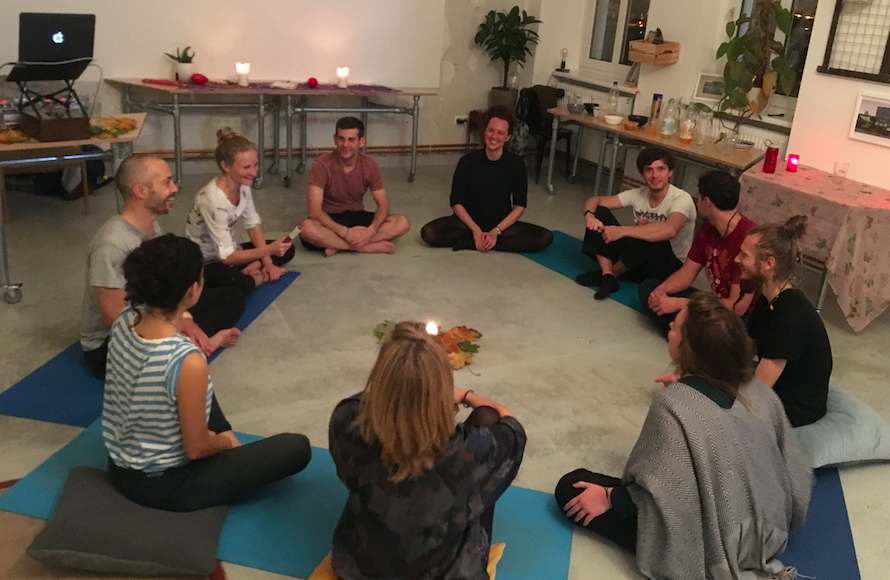
Through confidentiality and a gentle unlearning/re-training process in how to authentically relate to other humans, circles offer the opportunity to share what is alive in us and deeply listen to others without judgement.
In circle, there can be sharing, storytelling and discussion, but also movement, silence, music and nature. (We at Conscious Coliving help bring circles to coliving.)
It is so easy to swipe to the next person, lock ourselves in our room, and run away to another city. But is that what we want to keep doing? Do we want to keep running away from ourselves and each other? Or do we want to come together to create the shifts that will benefit us all?
The Future we Choose
Our planet and humanity are currently facing many challenges. And surely more lie ahead.
However, as we have written in our post on Coliving in 2021 and Beyond, we choose to adopt a mindset of stubborn optimism: a responsible choice in which we are fully aware of our challenging reality and at the same time filled with conviction that we possess the capacity and determination to change that reality for the better.
The Student Hotel and others are already pioneering the way towards a better future through thriving communities.
If you want extra inspiration, read the book The Future We Choose by Naima’s own mother, Christiana Figueres, former head of the UN Climate Change Convention who helped secure the landmark Paris Agreement on Climate Change.
This book provides an additional guiding framework for tackling our planetary crises and collaborating towards a future of thriving, not just surviving.
We look forward to continue co-creating the new living paradigm that we all want and deserve.
This article has been authored for you by:
Transformational Coach and facilitator. Trainer in mindfulness, sharing circles, and how to live and lead more consciously. Co-author of the Community Facilitation Handbook and the Coliving Apps & Tech Guide. Facilitates community engagement strategies.
Matt is responsible for designing community experience and impact strategies and measuring the social value of coliving communities. Matt is also a founding member and current Head of Community of Co-Liv and has worked for The Collective on their Impact Team.
